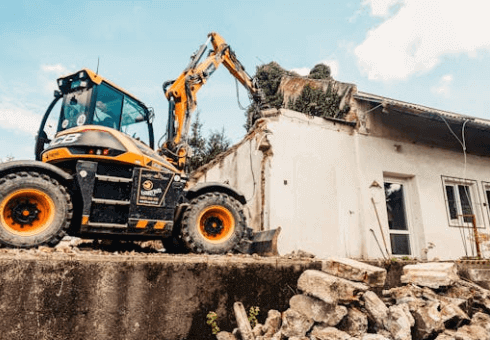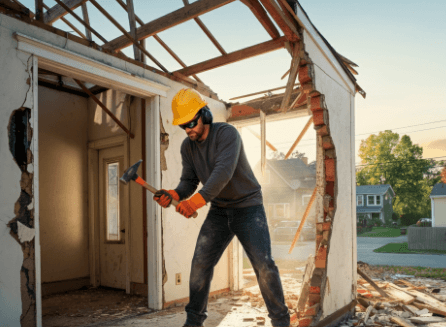Tearing down a house to build anew or clear a lot is a major project, and the first question is always about the price. The cost to demolish a house in Florida may commence at a few thousand dollars for a small building to tens of thousands for a larger home, depending on several factors. Your final cost can vary significantly based on factors like square footage, the materials used, and whether asbestos or lead abatement is required. Additionally, permit fees, utility disconnection charges, and debris hauling costs—which are often higher in coastal counties—also contribute to the total expense. Steve Daria and Joleigh, respected real estate investors and cash buyers, regularly assist property owners in evaluating their choices. They can help you determine if demolition is your best path forward or offer a practical alternative by purchasing your property as-is, saving you the time, expense, and hassle. If you’re trying to budget the cost to demolish a house in Florida and want expert advice on your situation, book a free, no-obligation discussion with Steve Daria and Joleigh today.
Key Points
- Size of the House: The cost often depends on the size of the house. Larger homes require more time, labor, and equipment, which can average the cost range between $5,000 and $15,000.
- Type of Demolition: Full demolition using heavy machinery is usually more expensive than selective demolition, where only part of the structure is removed. The method you choose can affect the total cost to demolish a house in Florida.
- Hazardous Materials Removal: If the house contains asbestos, lead paint, or other hazardous materials, additional costs will be involved for safe removal and disposal. This process can add a few thousand dollars to your budget.
- Permit Fees and Regulations: Local Florida laws require permits before demolition begins. Permit costs vary by county, ranging from a few hundred to over a thousand dollars, and can add significantly to your total expenses.
- Site Clean-up and Disposal: The debris left after the demolition must be properly removed and disposed of. This involves hiring trucks and paying landfill fees, which can cost another $2,000 to $5,000, depending on the materials.
Understanding House Demolition
Before examining the cost to demolish a house in Florida, it’s essential to understand what house demolition entails.
Demolition is tearing down a building, which can involve removing or eradicating specific structures.
It involves several steps, including obtaining permits, disconnecting utilities, asbestos removal, and safely dismantling the building.

The Process
- Permits and Inspections: Local authorities mandate these measures to guarantee safety and adherence to regulations.
- Pre-Demolition Preparation: Utilities must be disconnected, and all salvageable materials should be removed.
- Actual Demolition: Using machinery or manually, depending on the structure.
- Debris Removal: Clearing and disposing of debris and hazardous materials.
- Site Cleanup: Ensuring the area is safe and clean post-demolition.
Factors Affecting the Cost to Demolish a House in Florida
Several variables impact the cost of demolishing a house, making it essential to consider each aspect in your planning:
Size and Structure
- Square Footage: Larger homes naturally cost more to demolish than smaller ones due to the increased labor and time required.
- Material: Brick and concrete structures are more expensive to demolish than wood or metal buildings.
- Complexity: Multi-story buildings or those with basements require additional care and resources, leading to higher costs.
Location
- Geographical Area: Demolition costs can vary significantly between urban and rural areas. In Florida, coastal regions may have different pricing compared to inland areas.
- Accessibility: Easy-to-access sites are cheaper to demolish than those inaccessible or surrounded by other buildings.
Environmental Concerns
- Asbestos and Hazardous Materials: Removing asbestos or other hazardous materials can significantly increase costs.
- Salvage and Recycling: If you plan to salvage and recycle materials, this might reduce overall costs but require additional labor.
Permits and Regulations
- Permit Fees: Costs associated with obtaining necessary permits and conducting inspections.
- Compliance: Making sure compliance with local, state, and federal regulations can add to the expense.
Get Started: Get Your Cash Offer Below…
We are direct land buyers. There are no commissions or fees and no obligation whatsoever. Start below by sharing where your property is and where we can send your offer…
Typical Cost Breakdown
To provide a clearer picture, here’s a typical cost breakdown for demolishing a house in Florida:
- Permits and Inspections: $200 – $600
- Pre-Demolition Preparation: $1,000 – $3,000
- Demolition Costs: $4 – $15 per square foot
- Debris Removal: $500 – $2,000
- Site Cleanup: $300 – $1,500
For example, demolishing a 1,500-square-foot home could cost between $6,000 and $22,500, depending on various factors.
Strategies to Manage Demolition Costs
Managing the cost to demolish a house in Florida can be manageable.
Here are some strategies to help you stay within budget:
Obtain Multiple Quotes
- Competitive Bidding: Reach out to several demolition contractors and request detailed bids to compare prices and services.
- Due Diligence: Verify contractor credentials, reviews, and past projects to ensure quality work.
Plan for Salvage
- Material Reuse: Identify valuable materials that can be salvaged and reused, such as bricks, wood, fixtures, and metals.
- Recycling Partnerships: Partner with recycling companies to offset some of the disposal costs.
Do-It-Yourself (DIY)
- Partial DIY: Tackle smaller project parts, such as interior demolition or site cleanup, to reduce labor costs.
- Safety First: Always prioritize safety and adhere to regulations when considering DIY options.

Tips for a Smooth Demolition Process
Ensuring a smooth demolition process involves preparation and attention to detail.
Here are some tips:
- Hire Professional Help: Engage a licensed and insured demolition contractor with a solid reputation.
- Communicate Clearly: Keep an open line of communication with your contractor to stay updated about progress and any potential issues.
- Prepare Neighbors: Inform neighbors about the demolition schedule to minimize disruptions.
- Check for Hazards: Conduct a thorough inspection for asbestos, lead paint, and other hazardous materials before starting.
- Plan for Debris: Arrange for timely debris removal and site cleanup to avoid delays.
Frequently Asked Questions
Find answers to some of the most common queries regarding the costs and processes involved in demolishing a house in Florida.
How Long Does It Take to Demolish a House?
The timeline for demolishing a house can vary from a few days to several weeks, depending on the size and difficulty of the project.
Weather, permit approvals, and hazardous materials can also affect the timeline.
Is It Necessary to Hire a Professional Demolition Contractor?
While some aspects of demolition can be done DIY, having a professional contractor is highly recommended for safety, efficiency, and compliance with regulations.
Skilled contractors have the expertise and equipment to handle complex demolition tasks.
Can I Save Money by Salvaging Materials from the Demolition?
Yes, salvaging valuable materials can save money and reduce waste.
Items such as hardwood floors, bricks, fixtures, and metals can be repurposed or sold, offsetting some of the demolition costs.
What Permits Are Required for Demolition in Florida?
Permit requirements vary by location, but you will need a demolition permit from the local building department.
Additional licenses may be required for environmental considerations or hazardous material removal.
What Should I Do with the Debris After Demolition?
Debris removal is an integral part of the demolition process.
You can hire a debris removal service, rent a dumpster, or work with recycling companies to dispose of or repurpose materials.
The Florida Land Selling Guide offers additional context around selling timelines and processes.
**NOTICE: Please note that the content presented in this post is intended solely for informational and educational purposes. It should not be construed as legal or financial advice or relied upon as a replacement for consultation with a qualified attorney or CPA. For specific guidance on legal or financial matters, readers are encouraged to seek professional assistance from an attorney, CPA, or other appropriate professional regarding the subject matter.
